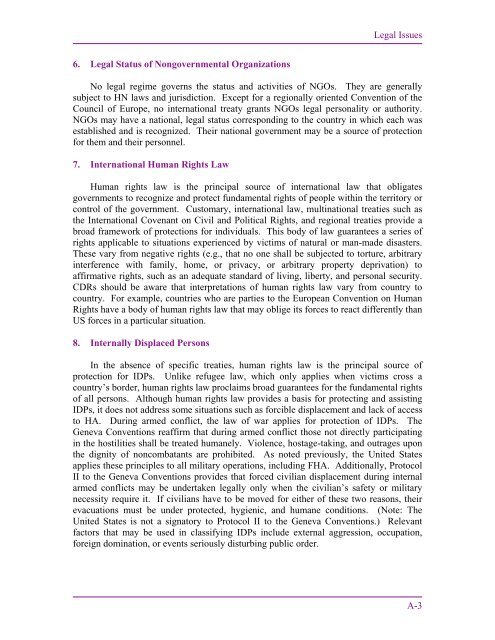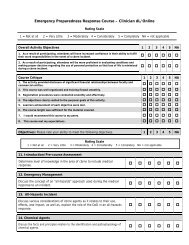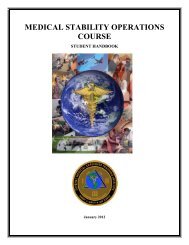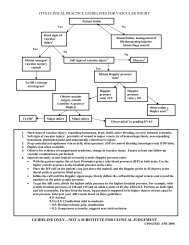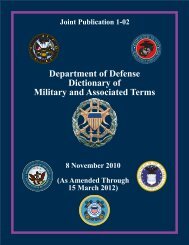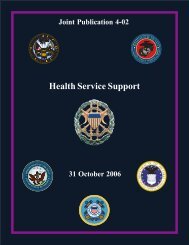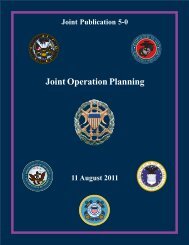JP 3-29 - Defense Technical Information Center
JP 3-29 - Defense Technical Information Center
JP 3-29 - Defense Technical Information Center
- No tags were found...
You also want an ePaper? Increase the reach of your titles
YUMPU automatically turns print PDFs into web optimized ePapers that Google loves.
Legal Issues6. Legal Status of Nongovernmental OrganizationsNo legal regime governs the status and activities of NGOs. They are generallysubject to HN laws and jurisdiction. Except for a regionally oriented Convention of theCouncil of Europe, no international treaty grants NGOs legal personality or authority.NGOs may have a national, legal status corresponding to the country in which each wasestablished and is recognized. Their national government may be a source of protectionfor them and their personnel.7. International Human Rights LawHuman rights law is the principal source of international law that obligatesgovernments to recognize and protect fundamental rights of people within the territory orcontrol of the government. Customary, international law, multinational treaties such asthe International Covenant on Civil and Political Rights, and regional treaties provide abroad framework of protections for individuals. This body of law guarantees a series ofrights applicable to situations experienced by victims of natural or man-made disasters.These vary from negative rights (e.g., that no one shall be subjected to torture, arbitraryinterference with family, home, or privacy, or arbitrary property deprivation) toaffirmative rights, such as an adequate standard of living, liberty, and personal security.CDRs should be aware that interpretations of human rights law vary from country tocountry. For example, countries who are parties to the European Convention on HumanRights have a body of human rights law that may oblige its forces to react differently thanUS forces in a particular situation.8. Internally Displaced PersonsIn the absence of specific treaties, human rights law is the principal source ofprotection for IDPs. Unlike refugee law, which only applies when victims cross acountry’s border, human rights law proclaims broad guarantees for the fundamental rightsof all persons. Although human rights law provides a basis for protecting and assistingIDPs, it does not address some situations such as forcible displacement and lack of accessto HA. During armed conflict, the law of war applies for protection of IDPs. TheGeneva Conventions reaffirm that during armed conflict those not directly participatingin the hostilities shall be treated humanely. Violence, hostage-taking, and outrages uponthe dignity of noncombatants are prohibited. As noted previously, the United Statesapplies these principles to all military operations, including FHA. Additionally, ProtocolII to the Geneva Conventions provides that forced civilian displacement during internalarmed conflicts may be undertaken legally only when the civilian’s safety or militarynecessity require it. If civilians have to be moved for either of these two reasons, theirevacuations must be under protected, hygienic, and humane conditions. (Note: TheUnited States is not a signatory to Protocol II to the Geneva Conventions.) Relevantfactors that may be used in classifying IDPs include external aggression, occupation,foreign domination, or events seriously disturbing public order.A-3


